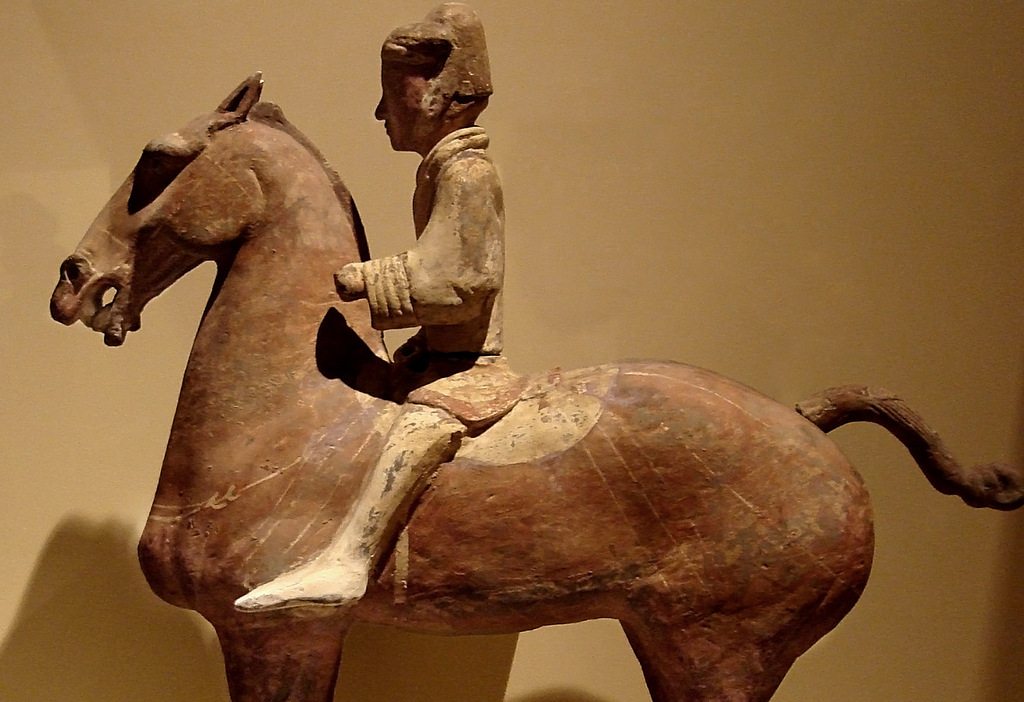Dogs may be man’s best friend and certainly they provide us with enormous affection and companionship. Often they have given and still give tremendous help in hunting, guarding, guiding the blind, finding landmines, herding and even finding truffles. Still I believe their contribution cannot compare to that made by horses to the rise of most world civilizations. The power and speed we gained through the use of our equine partners was enormous. When horses were first domesticated is extremely controversial among scholars. Certainly they were hunted for their meat from the time man moved into southern Europe from Africa; probably 50,000 years ago and very likely they were hunted long before that in North Africa. The famous cave drawing in southwestern Europe like Lascaux depict horses as one of the most frequently hunted animals of the period 25,000 years or so ago, but there is some tantalizing though inconclusive evidence that horses were also domesticated and possibly even used for horseback riding by these people.

Scholars are fairly certain that horses were domesticated and ridden on the steppes of Asia at least as far back as 5,000 years. They were used in Egypt and Mesopotamia at about the same time. Just as with sheep or cattle there were many other reasons for domesticating horses than riding them. Horse meat is excellent food, they have useful hides and give nourishing milk. It seems that their first use for military purposes in Egypt and Mesopotamia was mainly with horse drawn chariots which provided archers and javelin throwers with a platform from which to launch their missiles and greater speed than opposing foot soldiers. When the chariots were mounted with scythes on the wheels they must have been awe inspiring engines as they charged into massed foot soldiers.
The Mongols carved out the largest empire the world had known in the 13th century and certainly it was their horses which enabled them to accomplish this astounding feat. They galloped across Asia and into Europe with several horses per soldier so that riders could exchange mounts frequently. Often the army moved at such speed that it was able to attack before news came to the target that they were anywhere near. A fascinating aspect of the way they traveled light with such speed and effectiveness is that they had the practice of opening a vein in their horses so that they could suck blood for sustenance while galloping along. Of course blood is extremely nourishing and the traditional diet of the Masai was mainly blood and milk. They could take a certain amount of blood periodically from their cows depending on how good the grass was and it was part of the harvest so to speak. Some Americans are a bit squeamish about eating blood, even cooked, but their inhibitions do not change the fact that it is a very nutritious food high in protein. The British call it black pudding, in Germany it is blutwurst and the French call it boudin noir.
The importance of horses to civilizations and their power is graphically demonstrated by the arrival of Europeans in America. Many say that the horses of Cortez were more important in his victory over the vastly superior number of the Aztecs than his firearms. The Spanish jealously guarded their horses from the Indians, whose civilization they crushed. They were fully aware of the tremendous advantages horses gave them over the Indians. Beyond the tangible advantages of speed and power the horse had a huge psychological impact. The Spaniards were able to maintain their monopoly on horses pretty well until the rebellion in Santa Fe of 1680 where the Spanish government was overthrown and hundreds of horses were either captured or ran wild. After that horseback riding in Arizona became very popular and remains so to the present day. The American West was ideal horse country and they quickly multiplied and spread north over the Great Plains so that by the 1740s when the French explorer, de la Verendrye, came into Wyoming and Montana the Indians there were already acquiring them. Having the horse gave the Plains Indians an unprecedented empowerment; completely changing their way of life. Now they could hunt the buffalo effectively and it made their nomadic way of life following the herds far easier. It is interesting to imagine what would have happened if indigenous North Americans had acquired horses much earlier.
-Bayard Fox
See related articles here:
How Travel on Horseback Made our Civilization Possible
Horseback Riding and Humans: An Art Vital for our History

